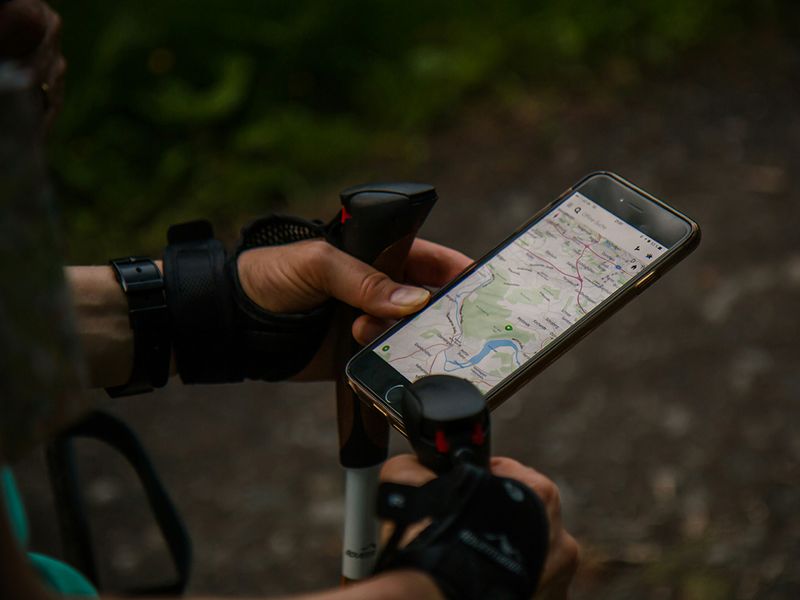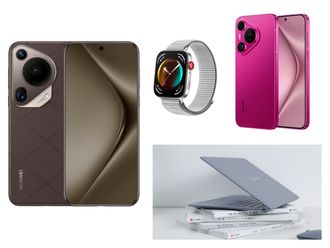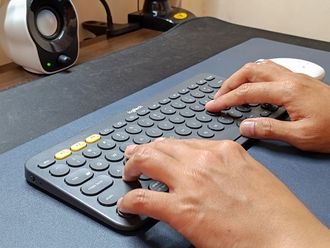
Google Assistant. Siri. Translation features and picture editing tools. For a long time, this was the extent of artificial intelligence (AI) on our smartphones.
But with the recent explosion in AI development, our phones are becoming smarter than ever before. So, it’s time to take advantage and tap into all the endless possibilities that await us on our favourite device.
Next-gen handsets now feature some serious software that could revolutionise how we use our phones in our daily lives. In fact, AI is fast becoming an important factor to consider before buying a new phone. Samsung was one of the first companies to put AI front and centre in its flagship phone – the Galaxy S24 range – but other brands have quickly caught up.
We spoke with Dr Sameer Kishore, head and founder of VRX Lab, and associate professor at the School of Science and Technology in Middlesex University Dubai, to understand the extent of AI in our lives, and how it’s set to transform the future. Scroll down to read what he said.
So, if you’re in the market for a new phone that does more than just call and text, we have a number of options for you. We curated a list of the best smartphones with AI that you can buy right now, in a range of budgets. Pick your favourite with Amazon Prime and get it as early as tomorrow.
1. Best Overall: Samsung Galaxy S24 Ultra
Pros
- Features many AI tools
- Excellent cameras
- Fast, responsive gaming
- Several professional tools
Cons
- New AI features add a delay
Although the Galaxy S24 and S24+ have much to recommend them, the Galaxy S24 Ultra is the ultimate AI phone you can buy right now, according to thousands of reviewers on Amazon. It has everything you’d want in a smartphone – one of the best camera systems, powerful gaming performance, and professional features via the Samsung DeX software that turns the phone into a laptop-like experience, with windows and an application dock. But its AI features stand out the most. Reviewers find its Circle to Search tool snappy and practical – it allows you to draw a circle on anything in the screen, providing an easy way to look it up on Google. Live Translation automatically translates voices from other languages into your mother tongue, in real time – incredibly useful if you’re travelling to foreign countries. Transcript Assist turns your voice recordings into text documents, so you no longer have to transcribe interviews or notes from meetings. Chat Assist can summarise web pages, translate results into 35 languages, and change the tone of emails and messages to make them more casual or professional. Then there’s AI photo editing software on the Galaxy, which includes generative photo editing that can fill in gaps left in an image if you move a subject to a different part of the shot. Any way you look at it, the phone is fantastic for AI, although some users do note that these new features add a delay.
Bonus: Buy with 0% installments and pay Dh291.58 for 12 months with select banks.
Warranty: Amazon offers one-year extended warranty by Salama Care for Dh199, one-year accidental damage protection for Dh332, and two-year damage protection with one-year extended warranty for Dh424.
2. Best Call Quality: Asus Zenphone 11 Ultra
Pros
- Premium build
- Excellent camera system
- Many AI translating and recording tools
- Generative wallpaper feature
- AI-assisted noise cancellation for phone calls
Cons
- Some AI features take up significant storage space
Powered by the same Snapdragon 8 Gen 3 chip as the ROG Phone 8 Pro and many other flagship phones, the Asus Zenphone 11 Ultra is a premium and powerful smartphone that includes some excellent AI features. Its camera system, for instance, uses AI to track and focus on subjects, and create smooth video stablisiation, while its Semantic Search makes it easy to find things, even if you make a typo. Like the Samsung flagship phone, this device has a Recorder app that can produce transcripts of your audio automatically, with appropriate punctuation, and a Call Translator feature that quickly translates phone calls as you speak and listen. You also have the ability to use AI to generate unique wallpapers, although this feature does eat into your storage space (the tool download alone, is over 3GB). Reviewers say its Noise Cancellation feature is the most useful, however – the phone removes all ambient noise when you’re on a call, allowing the recipient to hear you clearly, even if you’re in a crowded or noisy environment.
Bonus: Buy with 0% installments and pay Dh291.58 for 12 months with select banks.
Warranty: Amazon offers one-year extended warranty by Salama Care for Dh199, one-year accidental damage protection for Dh332, and two-year damage protection with one-year extended warranty for Dh424.
3. Best for AI Photography: Xiaomi 14 5G
Pros
- 50MP triple camera system
- Fun and practical AI photography tools
- Bright screen
- Plenty of storage
Cons
- Tends to have bloatware
Equipped with a better display than its predecessor, along with twice the storage and completely revamped camera hardware, Xiaomi 14 is upping its game this year, and its AI functionality has a lot to do with it. Using next-gen Leica optics, its impressive 50MP triple camera system features integrated AI that optimises its photographic modes and capabilities. It can even fuse RAW images together to create a single picture with a massive dynamic range. But reviewers claim one of its most fun features is the AI Portrait tool. The camera on this phone can be trained to learn your face, by taking multiple selfies. Then, it can create fake selfies of you anywhere – even on the moon! The phone uses a snappy Snapdragon 8 Gen 3 processor, and has a bright, 6.36-inch AMOLED display, with significant 12GB RAM and 512GB storage. And with most of its AI focus centred around its camera system, it’s a great purchase, if you love taking pictures with your smartphone.
Bonus: Buy with 0% installments and pay Dh230.58 for 12 months with select banks.
Warranty: Amazon offers one-year extended warranty by Salama Care for Dh171, one-year accidental damage protection for Dh285, and two-year damage protection with one-year extended warranty for Dh363.
4. Best Foldable Phone: Samsung Galaxy Flip 5
Pros
- Versatile cover display
- Compact design
- Excellent long-term software support
- AI features across the board
Cons
- Battery life could be better
Since Samsung has the largest slice of the pie, when it comes to AI technology right now (at least until Apple releases the much-anticipated iPhone 16), it makes sense to have more than one phone from the brand on this list. The Galaxy Flip 5 has all the AI tech that the S24 Ultra does, but with a unique flip design that makes it a pocket-friendly, compact phone. From real-time interpretation on phone calls, to picture retouching and editing, to easier search functions to instant formatting of notes into clear summaries – AI works on multiple levels in this smartphone. Reviewers also love that the phone’s flip design gives them the best selfie camera, since it’s essentially the same 12MP main camera that you get when you flip open the phone. A customisable Flex Window with a slew of widgets, video wallpapers and clock faces, adds a touch of fun to the phone and makes it uniquely personal.
Bonus: Buy with 0% installments and pay Dh200.83 for 12 months with select banks.
Warranty: Amazon offers one-year extended warranty by Salama Care for Dh142, one-year accidental damage protection for Dh238, and two-year damage protection with one-year extended warranty for Dh303.
5. Best Budget: Motorola Edge 50 Pro
Pros
- Great camera performance
- TurboPower charging
- Excellent display
- Useful AI photography features
Con
- Only three years of Android updates
The entire Moto Edge 50 series has integrated AI functionality for people looking to buy a smart phone at an affordable price. The Edge 50 Pro’s Snapdragon 7 Gen 3 processor is extremely fast, and its vivid 6.7-inch Super HD display is Pantone validated, so its captures colours and skin tone with incredible realism. AI shines in its camera system. The AI-fuelled motion capture ensures videos are free from blur, and a 3x telephoto lens uses AI to capture incredible detail, even in shots taken from a large distance. Other enhancements, like AI-based Google Photo tools – Magic Eraser, Photo Unblur and Magic Editor – are also available on this phone. Other aspects, like fast, 125W TurboPower charging that can give you battery power for the whole day in just four minutes, make the phone a compelling purchase. However, do note that the Edge 50 Pro is only receiving Android updates for three years, according to Motorola.
Bonus: Buy with 0% installments and pay Dh165 for 12 months with select banks.
Warranty: Amazon offers one-year extended warranty by Salama Care for Dh114, one-year accidental damage protection for Dh190, and two-year damage protection with one-year extended warranty for Dh242.
How useful is AI for the average person on the street?

Although AI has long functioned behind the scenes, in the past few years, it has gone mainstream. Even the average person on the street now knows about its potential, and its influence on user behaviour and how we consume information.
Dr Kishore says its usefulness cannot be undermined, especially in the modern age. He explained: “AI's utility for the average person is substantial, primarily because it integrates seamlessly into daily activities, enhancing convenience and efficiency. In the last few years, the rise in popularity of LLMs (Large Language Models) and generative AI (for example, ChatGPT) has allowed us to see for ourselves how useful AI could be.”
The technology has revolutionised content creation in advertising and marketing, and has enhanced learning for students. Dr Kishore added: “AI also powers personalised recommendations in streaming and shopping platforms, such as Netflix and Amazon, optimises route planning in navigation systems (Google Maps, Waze), and automates routine tasks through smart home devices.”
He predicts that AI has the potential to become indispensable in healthcare, finance and education. So, we can expect even further integration of these technologies in everyday life, as time moves on.
AI in smartphones is a natural way forward
The inclusion of AI in smartphones comes as absolutely no surprise for our expert. In fact, he shares how it has long been a part of communications technology.
Dr Kishore said: “AI has been built into smartphones for many years now, already. Voice assistants (Siri, Alexa, Cortana) are fundamentally based on AI to function. Natural Language Processing (NLP) is a sub-topic within AI that allows these assistants to understand and interpret the verbal instructions one gives to their phone. In addition, machine learning (ML) algorithms on our phones are able to automate and predict many patterns and routines, such as setting alarms based on your typical waking hours, detecting health trends based on your smartwatch data and even warning users in case there might be a significant change in their heart rate data, for example.”
It doesn’t stop there. One area where AI is truly making its mark these days, is in mobile photography. Dr Kishore said: “Photo editing on the phone has become much more powerful with AI, with phones now able to remove subjects from a background, sharpen blurry photos, or even open the eyes of the people who blinked as the photo was being clicked! With the addition of more powerful, generative AI, their functionalities would be further enhanced, specifically with voice assistants, and photo/video editing gaining the most intelligence.”
AI concerns worth your consideration

While AI seems futuristic and solution-oriented, with the ability to improve our lives in countless ways, there are some concerns worth considering.
Foremost among them are issues related to privacy and security. Dr Kishore explained: “AI systems often require access to vast amounts of data, including personal information, to function effectively. This raises concerns about how data is collected, used, and protected.”
Another problematic aspect is the potential for bias in AI algorithms, which, our expert says, can lead to unfair outcomes, in areas like job recruitments and loan approvals.
A more recent issue that’s cropping up has to do with deepfakes and scams. Dr Kishore said: “Deepfakes, which are hyper-realistic video and audio recordings made with AI, can be used to create false representations of individuals, potentially damaging reputations or spreading misinformation. Based on this technology, sophisticated scam operations can be carried out by impersonating a phone call or a voice note from someone you might know, or an authority figure, making it more convincing and difficult to detect.”
However, world governments and regulatory bodies are already aware of and focusing on this issue. With the creation of new guidelines and laws, a focus on transparency and responsible use of AI can help counter such issues, and help restore people’s trust in such technologies.
Tips for using AI-based technology on your smartphone
Dr Kishore shared some tips on embracing a smart and safe approach to using AI on your smartphones and other smart devices:
- Assess your privacy settings: Be aware of your privacy settings and understand what data your AI applications are collecting. Choose to download apps from reputable developers and platforms that clearly state their data usage policies.
- Be vigilant: It's extremely important to be careful when consuming information that you see online. Given how AI can produce convincing, yet potentially inaccurate or misleading content, such as deepfakes or automatically generated news articles, users should be vigilant.
- Verify the truth: It's crucial to verify the truth behind the content that you might receive on WhatsApp or through a story on Instagram. Always cross-check information with trusted and verified sources, especially for news or other significant content that could impact decisions or beliefs. By doing so, one can safeguard themselves against misinformation that could have been AI generated.
Our recommendations are independently chosen by Gulf News editors. If you decide to shop through links on our website, we may earn an affiliate commission, as we are part of Amazon Services LLC Associates Program.










